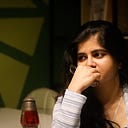Chashm-e-Baddoor — The Art of Aesthetic Appreciation
A Sufi Celebration of Life, Inspired by Urdu
Urdu is the new French. Or at least it should be.
Undoubtedly, it is hard to surpass the enigma of La Vie En Rose or do justice to the sweet agony of La Petit Mort or just be as beautiful as Je t’aime.
Urdu, however, rises to the challenge. Riddled with words and phrases that are a linguistic paradise for lovers, poets and romantics, Urdu’s delicate sense of aesthetics is as glorious and enthralling as the silky sensuality of French.
They are two different languages of love. But, they are true languages of love nevertheless; each as captivating and poetic as the other, if not more.
For all the die-hard romantics out there—next time you need to add that extra zing to your proposal, give French clichés a slip and turn to Urdu instead. Trust me, you will not be disappointed.
Here is a sample.
Ek Kami Thi Taj Mahal Me,
Maine Teri Tasveer Laga Di
--Kaif Bhopali
There was but one flaw in the great Taj Mahal
I placed your portrait in it and it was rectified
This preamble about Urdu’s great romantic tradition is not without a reason. Because today’s piece is all about romance.
Chashm-e-Baddoor.
Literally translated, Chashm-e-Baddoor draws its meaning from its Persian roots and means ‘far be evil eye’.
And in that phrase alone, lies the genius of this expression. It is one of the finest examples of how an appreciation can be couched without falling into the ugly pit of bland, tasteless objectification. It is also an expression that accepts, understands and makes way for the idea that beauty is multi- dimensional and may or may not be limited to merely the physical.
Chashm-e-Baddoor.
In essence, it means that you are so beautiful; and/or worthy; and/or so loved; and/or so desirable; that you may fall prey to the evil eye, and I, that is, your admirer/well-wisher prays that you be safe and be warded from all potential evil.
As far as expressions of admiration go, this is a stunning thought. It is appreciation, and respect, and concern, and just the right amount of protectiveness, all wrapped in together like a poem — in one single phrase.
What an absolute poetic delight it must be to be the one giving this compliment; and how beautifully gratifying it would be to be at the receiving end of it.
This is what romance should look like. Like early morning dew drops on lush green grass blades, basking in the rays of the rising Sun.
Bright, delicate, mesmerizing, ethereal and so complete.
Imagine someone gifting you those dew drops as a Valentine’s gift. Imagine being someone giving that gift.
Imagine being worthy of being at either end of that exchange.
That is what Chasm-e-Baddoor feels like. That is what it symbolizes.
Of course, it would be reductive to confine Chashm-e-Baddoor to conventional romance. Beauty and romance as concepts transcend the boundaries of carnal associations. So does Chashm-e-Baddoor. Ultimately, it is about appreciation and how moving something is for you. It is an expression of a feeling that is bone deep — something like love maybe, but something beyond that too.
Da Vinci’a Mona Lisa, The Taj Mahal, your pet, your mother (or father), Paris, Northern Lights, your Hollywood crush, your favorite book, the movie that made you cry, the song that you have been listening on loop, the TV show that helped you get through your depression, your therapist, that friend who never lets you down…
Each one of them is potentially a candidate for Chashm-e-Baddoor — a moment to let them know how beautiful they are to you…and a prayer to keep them safe, hale and hearty.
There is a thin line between objectification and appreciation. Above that line is a small galaxy that hovers nice and bright.
Chashm-e-Baddoor is that galaxy.
It is a reminder that beauty is not skin deep. But also, that while all objectification is toxic, a world without appreciation of beauty is a world without creativity, and art, and music, and everything else that makes living worthwhile. In other words, a very boring world.
The idea of beauty is perhaps one of the most understated, rarely noted victims of the centuries of patriarchy across societies. What was designed by the Universe as an aesthetic motivator; a fuel for creativity, innovation and art became a tool of systemic violence and oppression. It became dirty and evil and problematic at so many levels; it is downright scary. The distortion and defacement of the very idea of appreciation of beauty has brought us to a place where we have forgotten how to distinguish between admiration and objectification.
The lines are not blurred. They are gone. And that is the tragedy of the times we live in.
Chashm-e-Baddoor is a reminder of those long forgotten lines; of spaces where appreciation and admiration are healthy, productive and the source of human creativity and art; of thoughts and head-spaces that know how to celebrate beauty but are also aware of where to draw the line; the ideas where humans are more than just pieces of meat; of places where they are allowed their dignity and humanity, and the deference for being the Universe’s finest creations (before we went and ruined it for everyone).
Chashm-e-Baddoor is a reminder that not all appreciation has to be monstrous. And that a thing of beauty can indeed be a joy forever.
If we learn to let it be.
Hey Guys! If you enjoyed reading this piece, please don’t forget to click on the little green ❤ below! Also, I am trying out this new newsletter thingie. You can sign up for my latest pieces and/or the ebook that may be coming very soon!
